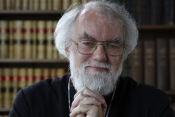Pope speaks out against 'scourge' of usury

Source: Vatican News Service
Pope Francis met members of the National Anti-Usury Council, at an audience in the Clementine Hall at the Vatican on Saturday, 3 February. In his address he told them: "Usury is an ancient and unfortunately still concealed evil that, like a snake, strangles its victims. It must be prevented, by removing people from the pathology of debts accrued to get by or to save their business."
The Holy Father thanked the council for its 26 years of service, noting: "you have saved over 25,000 families from the grip of usurious debt and from the risk of usury; by saving their home, and sometimes their small businesses, you have helped them recover the dignity that had been expropriated from them."
The full text of the Pope's address follows:
Dear brothers and sisters,
I am pleased to welcome you and to share with you this moment of reflection on a scourge that is unfortunately widespread and still very concealed: usury. I thank the President for his kind words, and I offer a thought for Father Massimo Rastrelli, who in 1991 established the first Anti-usury Foundation.
I follow with particular attention your fight against usury, which becomes increasingly qualified and practical with experience and with the establishment of new foundations distributed throughout the national territory through hundreds of advice centers. They are presidia, schools of humanity and of education in legality, the fruit of a sensitivity that finds its illuminating inspiration in the Word of God, and which works silently and industriously in people's consciences. Inspiration and that operates silently and laboriously in people's consciences.
In your first twenty-six years of service you have saved over 25 thousand families from the grip of usurious debt and from the risk of usury; by saving their home, and sometimes their small businesses, you have helped them recover the dignity that had been expropriated from them. And this deserves to be praised. Thank you, thank you very much.
Usury humiliates and kills. Usury is an ancient and unfortunately still concealed evil that, like a snake, strangles its victims. It must be prevented, by removing people from the pathology of debts accrued to get by or to save their business. And it can be prevented by educating in a sober lifestyle, able to distinguish between the superfluous and the necessary, and which promotes responsibility in not assuming debts to obtain things that could be renounced. It is important to restore the virtue of poverty and sacrifice: of poverty, so as not to become slaves to commodities, and sacrifice, because in life you cannot receive everything.
It is necessary to form a mentality based on legality and honesty, in individuals and in institutions; to increase the presence of volunteers who are motivated and available to the needy, so they may be listened to, advised and guided, so as to rise out of their humiliating condition.
At the base of economic and financial crises, there is always a conception of life that places profit first and not the person. Human dignity, ethics, solidarity and the common good should always be at the center of economic policies implemented by public institutions. These are expected to discourage, through appropriate measures, those instruments that, directly or indirectly, are a cause of usury, such as gambling, another scourge. I saw and heard of old women in Buenos Aires, who went to the bank to receive their pension and from there they went to straight to the gambling establishment. It is a pathology that takes hold of you and kills you!
Usury is a serious sin: it kills life, tramples on the dignity of people, is a vehicle for corruption and hampers the common good. It also weakens the social and economic foundations of a country. In fact, with so many poor people, many indebted families, so many victims of serious crimes and so many corrupt people, no country can plan a serious economic recovery or even feel safe.
Dear brothers and sisters, I know well that the service you render is burdensome: it involves collaborating to render human the social-economic system is human and to ensure that the Gospel message can illuminate the heart and soul of people, as happened one day to Zacchaeus, the rich and corrupt leader of the "publicans" of Jericho (cf. Lk 19: 1-10), and his colleague Matthew, upon whom Jesus looked with mercy and chose as a disciple, and who for a year has been Patron of the Anti-Usury Foundations (cf. Mt 9: 9-13). A beautiful pilgrimage that you can make, to see the soul of a man attached to money, to usury, is to [the Church of] San Luigi dei Francesi, to see Caravaggio's Calling of Saint Matthew. Matthew goes like this [makes a gesture] with his money as if it were his children. This depicts well the attitude of a man attached to money. May the Lord inspire and support public authorities so that people and families can enjoy the benefits of law like any other economic reality; inspire and support the leaders of the banking system, so that they may monitor the ethical quality of the activities of banks. It is worth pointing out that many banks were born and spread throughout the world precisely to lift the poor out of usury with loans without a pledge and without interest.
Dear brothers, your service demands that you be men and women of encounter, of listening, of closeness. For this reason, I urge you to keep your eyes and hearts fixed on Jesus, to concentrate on the pages of the Gospel in which He meets the poor and beggars, lepers and paralytics and "puts them back on their feet", restoring their dignity and future. Facing usury and corruption, you too can transmit hope and strength to the victims so that they can recover confidence and recover from their needs. For the institutions, you are a stimulus to the assurance of practical answers to those who are disorientated, at times desperate, and do not know how to support their family. For usurers themselves, you can be a reminder of a sense of humanity and justice, to make them aware they cannot kill their brothers in the name of money!
In addition, I encourage you to enter into dialogue with those who have responsibility in the field of economics and finance, so that initiatives may be promoted that help prevent usury. I do not need to give you concrete examples: you are well aware of them; but it means always having respect for faces, to truly put at the center the person and the family, not in words but in deeds.
The people you have helped come out of usury can testify that the darkness of the tunnel they have passed through is dense and distressing, but there is also a stronger light that illuminates and gives consolation. For the poor, the indebted, businesses in difficulty, may you be a point of reference for hope. Continue your service with perseverance and courage: it is a valuable leaven for all society. The victims of usury and gambling know this well and have come here with their representation. I greet them and encourage them because I know they have undertaken a new journey with God's help, and with the solidarity of many brethren. Transmit your courage to the people who are still inside that tunnel, describing your experience, showing that you can leave usury and gambling behind.
Together, let us make an appeal for a new economic humanism, which "puts an end to the economy of exclusion and inequality", to the economy that kills, to economic systems in which men and women are no longer people, but are reduced to the tools of a throwaway logic that generates profound imbalances (cf. Message to the International Symposium on the Economy, 26 November 2016).
Thank you for your presence, for your work, and I warmly bless you and your work. And please, do not forget to pray for me. Thank you.


















